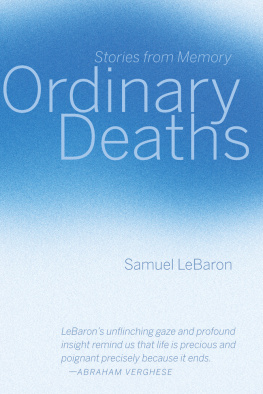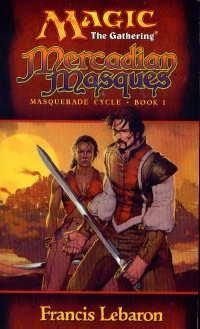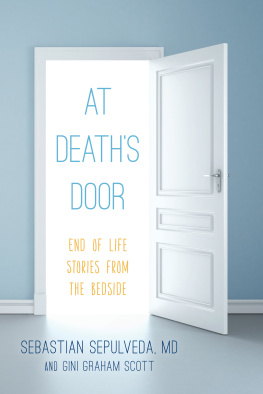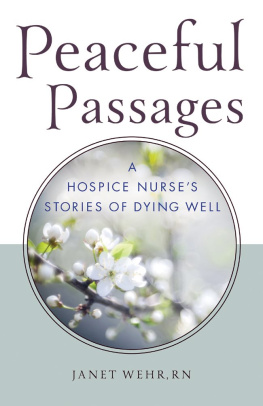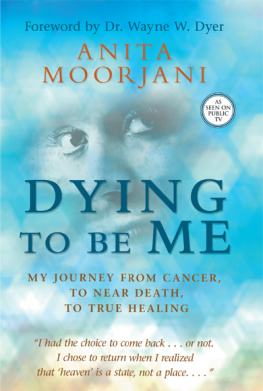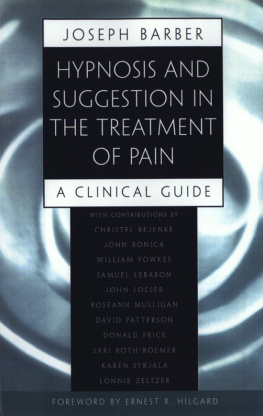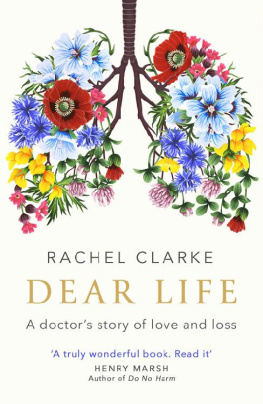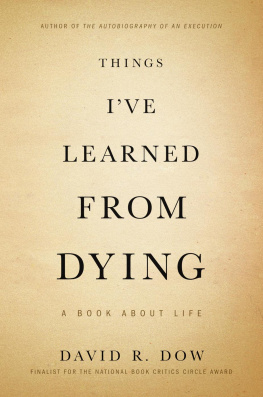

Published by
University of Alberta Press
116 Rutherford Library South
11204 89 Avenue NW
Edmonton, Alberta, Canada T6G 2J4
amiskwaciwskahikan | Treaty 6 | Mtis Territory
uap.ualberta.ca |
Copyright 2022 Samuel LeBaron
LIBRARY AND ARCHIVES CANADA CATALOGUING IN PUBLICATION
Title: Ordinary deaths : stories from memory / Samuel LeBaron.
Names: LeBaron, Samuel, 1943 author.
Identifiers: Canadiana (print) 20220225923 | Canadiana (ebook) 20220226075 | ISBN 9781772126563 (softcover) | ISBN 9781772126723 (EPUB) | ISBN 9781772126730 (PDF)
Subjects: LCSH: LeBaron, Samuel, 1943 | LCSH: PhysiciansUnited StatesBiography. | LCSH: CancerPatientsCare. | LCSH: Terminally ill. | LCSH: Terminal care. | LCSH: Bereavement. | LCSH: Loss (Psychology) | LCSH: Death. | LCGFT: Autobiographies.
Classification: LCC R726.8 .L43 2022 | DDC 362.17/5dc23
First edition, rst printing, 2022.
First electronic edition, 2022.
Digital conversion by Transforma Pvt. Ltd.
Copyediting and proofreading by Julie Sedivy.
Cover design by Alan Brownoff.
All rights reserved. No part of this publication may be reproduced, stored in a retrieval system, or transmitted in any form or by any means (electronic, mechanical, photocopying, recording, or otherwise) without prior written consent. Contact University of Alberta Press for further details.
University of Alberta Press supports copyright. Copyright fuels creativity, encourages diverse voices, promotes free speech, and creates a vibrant culture. Thank you for buying an authorized edition of this book and for complying with the copyright laws by not reproducing, scanning, or distributing any part of it in any form without permission. You are supporting writers and allowing University of Alberta Press to continue to publish books for every reader.
University of Alberta Press gratefully acknowledges the support received for its publishing program from the Government of Canada, the Canada Council for the Arts, and the Government of Alberta through the Alberta Media Fund.

Contents
Introduction
During the time when I worked in family medicine at Stanford University, a journalist called and said he wanted to interview me about death. He laughed when I asked him, Will this be in regard to yours or mine?
He explained that hed read some of my articles about dying patients and their families, and for the first time in his life hed been thinking about the reality of his own death.
One of his first questions for me was, How did you become so interested in it? There must have been experiences that made you think about this a lot.
I recalled that during my professional years, I often wondered why I felt death was so familiar. It occurred to me finally that just as some children grow up familiar with art or music, my early experiences predisposed me to recognize and follow currents where life and death flow together.
One profound event occurred through an act of transgression in childhood: against my mothers instruction, I stepped out of the safety of our yard to follow what I thought was the voice of a dog, and came upon death in the woods. Years later, this memory became more compelling to me when I learned of Cerberus, the three-headed dog in Greek mythology who guarded the underworld, and of Mesoamerican beliefs that dogs had a special role in guiding the newly deceased.
Death wasnt a word or an idea for me until I was three or four years old. I witnessed it all around by watching flies, worms, grass, leaves, and flowers, and sometimes a bird or animal. Life and death were everydaythey were just what happened.
One day I saw people stand in a circle, crying. I listened and heard them whisper about someone who had died. I realized then that death was for people toomaybe including me. So birth and death were simply as much a part of being alive as my two feet or my hair, or tongue, or eyes. How could I not be interested?
Over many years, those experiences with death made it real and personal. As a young adult I came to fear deaths unknown regions and its losses, but with older age I recovered a childs awareness. Death was integral to life, and as ordinary as waking and sleeping.
The journalist asked what I meant by ordinary.
Familiar. Universal. But too often ignored. Every death is important because every life is potentially meaningful. Some deaths are tragic, painful. And yet the reality of death is familiar, whether the death arrives in the middle of a struggle to live or as a welcome release from a life well lived.
Your death may be so poignant or unusual that others build an entire story around it. My death may be ordinary to others: hardly noticed and soon forgotten. Whether large or small, lives and deaths can be mundane and banal, or awful and horrific. They can be peaceful, tender, or heroic. The death of a friend could be the last page in a book of honor and courage, or forgiveness and redemption.
In the Muse des Beaux Arts in Brussels theres a painting by Bruegel depicting the fall of Icarus. The story of Icarus is so prominent in Western mythology you might expect the moment of his death to be central in the painting. But instead, in the bottom right corner of the frame, all we see are the legs of a tiny figure as he plunges into the ocean. Meanwhile, a farmer, a fisherman, a ship, and various animals continue on as if nothing of importance had happened. As W.H. Auden observed in his famous poem about this painting, they all turn away quite leisurely.
Did you ever have the experience of walking out of a theatre after a movie with a tragic ending? When you step out onto a busy sidewalk theres a shocking moment as you realize nobody around you shares your experience. Instead, their concerns are shopping or traffic or their phone. Doctors and nurses often have the same experience as they step outside the hospital where moments before their patient died. The death may be momentous to the family, while to the rest of the world its ordinary. Maybe a three-line obituary nobody will read.
If you talk with somebody whos survived cancer, theyll probably tell you something like this: I wouldnt wish for anyone to have cancer, but the new appreciation for life that comes with it has transformed me and my family for the better. Thats something Id wish for everyone. Preferably without cancer.
The journalist smiled. Okay, I got it now. I heard my dad say almost exactly those words after he survived a heart attack. And he did have a new appreciation for life. He changed a lot, for the better, after that.
I always loved this quote attributed to Mark Twain: The fear of death follows from the fear of life. A man who lives fully is prepared to die at any time.
He sighed. I realize that was one of the things my dad tried to tell me. But I didnt get it. Im going to call him tonight and share this with him.
I told him how this wish to share our experiences of life and death had affected me when I returned from a day with patients and my children greeted me with the question What did you do at work today? I was struck speechless, full of images but without words to express them. Even to myself, some days were impossible to describe. I began to keep notes and vowed that one day Id find a way to tell them what I did at work. I wanted to honor their curiosity as well as the suffering and courage of our patients. I also wanted to explore how these patients affected me.
Next page
